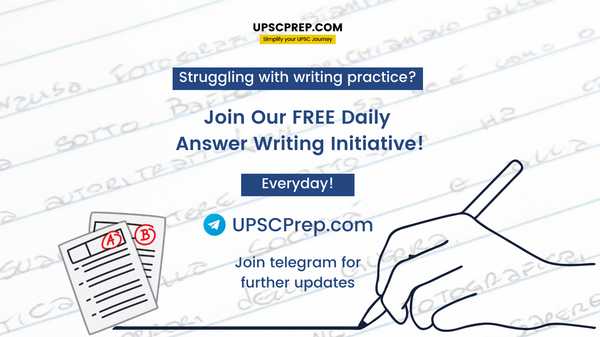Subject: GS 4
Syllabus: Attitude
Questions
- Attitude has a huge role to play in the personal as well as professional lives of individuals. Explain. (150 Words, 10 Marks)
- Attitude is often described as a key determinant of an individual's behaviour. In light of this statement, analyse the relationship between attitude and behaviour. (150 Words, 10 Marks)
Model Structure
- Attitude has a huge role to play in the personal as well as professional lives of individuals. Explain. (150 Words, 10 Marks)
Model structure
Introduction
- Attitude is a learned predisposition to think, feel, perceive and act in a particular way towards any external or internal object. That object may be tangible or intangible and include any individual, organisation or a social issue.
Main body
- Functions of attitude in personal life-
- Promotes positive thinking and forward looking mindset. Failures come and go but rather than feeling defeated, one must learn from it and avoid repeating mistakes.
- Helps maintain acceptance, good behaviour and understanding. It further helps in maintaining balance between personal and professional life.
- Brings empathy and self-belief. Even with continuous rejections, one can make a comeback with a positive attitude.
- Functions in professional life-
- Important for courage and honesty in public life as it helps uphold rule of law and take on violators of law and order.
- Helps prevent corruption as an attitude of accountability and impartiality helps to further organisational interests.
- Brings compassion and objectivity which helps discharge duties properly.
- Emotional intelligence is developed which helps balance personal and professional life and manage stress.
Conclusion
- Right attitude is indispensable for the excellent growth of personality in professional life. To quote Thomas Jefferson, “Nothing can stop the man with the right mental attitude from achieving his goal, nothing on Earth can help the man with the wrong mental attitude.”
- Attitude is often described as a key determinant of an individual's behaviour. In light of this statement, analyse the relationship between attitude and behaviour. (150 Words, 10 Marks)
Model Solution:
Introduction
- Attitude is an evaluation people make towards persons, objects, ideas or events. On the other hand, behaviour is the conduct of an individual in response to their environment or stimuli. (Definition-based)
- John C. Maxwell once said - “People may hear your words, but they feel your attitude." (Quote-based)
Main Body
Relationship between attitude and behaviour
- Our attitudes, often shaped by our values and beliefs, play a crucial role in dictating our behaviours and, thereby, our lives.
- For example, an individual with a negative attitude towards women could manifest discrimination and inequality in their interactions and dealings with women.
- On the other hand, attitude does not always drive behaviour.
- For example, all of us have positive attitudes toward good health, but most of us do not exercise and frequently eat junk food. Similarly, one may have a healthy attitude towards the environment, but if he gets an opportunity to buy an AC or a car, he will definitely buy them.
- Behaviour also affects attitude because one’s behaviour forms habits.
- For example, children are taught to be punctual in school, and later, punctuality becomes their attitude.
Attitude and behaviour may go hand in hand or not, depending on the following factors:
- People aware of their feelings display greater attitude and behaviour consistency than those who rely on situational questions to decide how to behave.
- For example, a person who is aware of their passion for animal rights will consistently demonstrate their beliefs by attending protests, volunteering at shelters, and promoting veganism.
- People with a high level of integrity show a high correlation between Attitude and Behaviour.
- People in individual societies have more correlation compared to people in collective societies.
- For example, in individualistic societies like the USA, personal achievements and independence are often emphasised, leading to behaviours that align with personal beliefs. In collective societies like Japan, group harmony is prioritised, so an individual might suppress their personal beliefs to conform to group norms.
- Individuals who depend on their feelings and principles to judge act much more consistently with their attitudes towards moral issues than the people who rely on external standards to determine what is moral.
- Qualities of attitude – Strong and weak attitudes show a high and low correlation between attitude and behaviour.
- For example, a strong attitude towards healthy living might lead a person to consistently exercise and eat well. A weak attitude, however, such as a mild preference for a political party, might not translate into consistent voting behaviour or political activism.
- Attitude accessibility – Attitudes which are acted upon regularly are more accessible from memory. Such attitudes show a higher correlation with behaviour.
- For example, if someone has a well-established attitude towards supporting local businesses, they will likely remember this preference easily and consistently choose local stores over big chains. This attitude is accessible and frequently guides their behaviour.
- Situation: Norms or beliefs about how one should or is expected to behave in a given situation can exert a powerful influence on behaviour.
- Time pressure results in behaviour as per attitude.
Conclusion
- Understanding this relationship is crucial as it allows us to predict behaviours and initiate change, whether on an individual level or a societal one. Effective strategies for change need to consider not just attitudes but also the social, cultural, and situational factors that influence behaviour.

